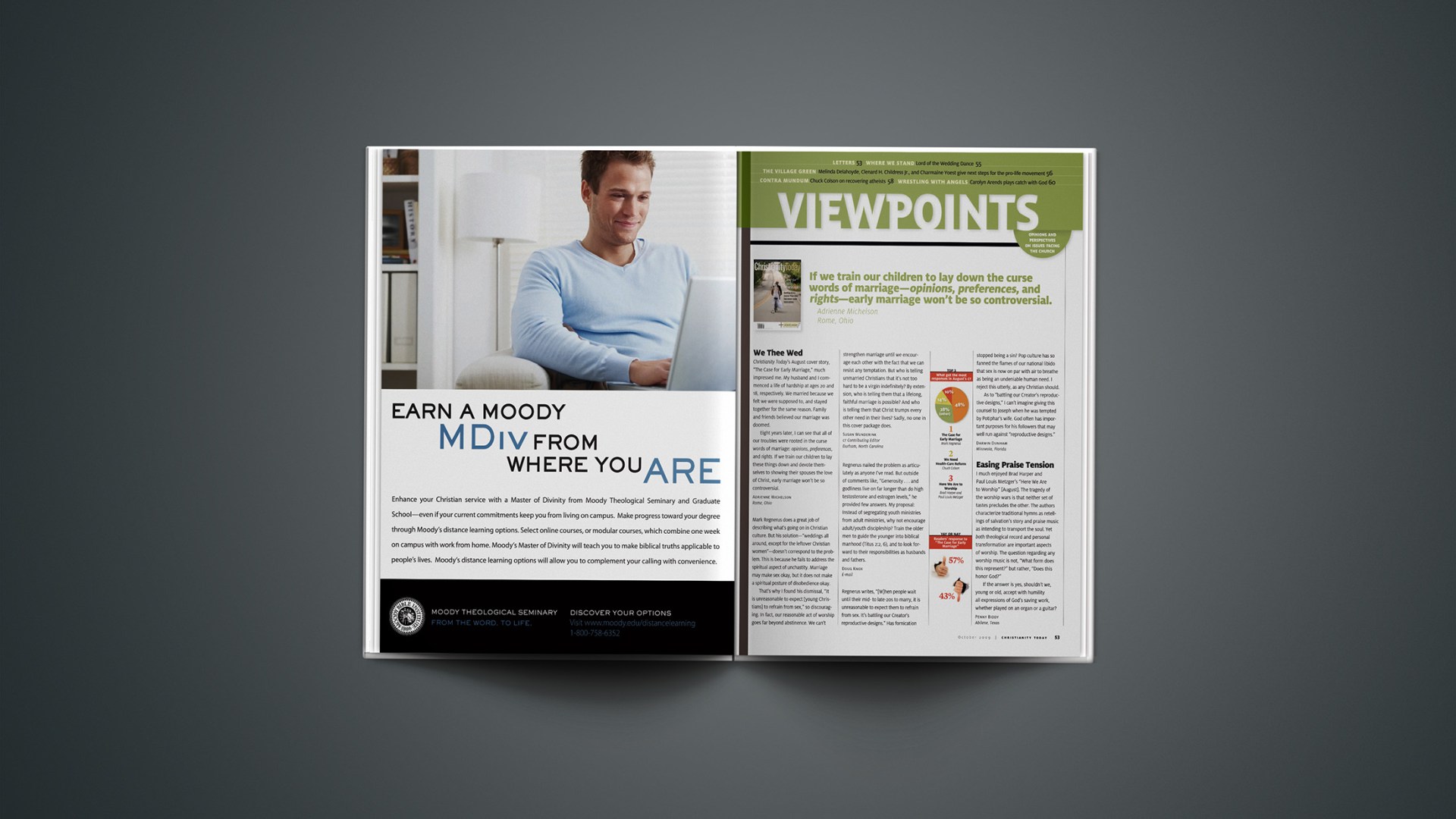We Thee Wed
Christianity Today‘s August cover story, “The Case for Early Marriage,” much impressed me. My husband and I commenced a life of hardship at ages 20 and 18, respectively. We married because we felt we were supposed to, and stayed together for the same reason. Family and friends believed our marriage was doomed.
Eight years later, I can see that all of our troubles were rooted in the curse words of marriage: opinions, preferences, and rights. If we train our children to lay these things down and devote themselves to showing their spouses the love of Christ, early marriage won’t be so controversial.
Adrienne MichelsonRome, Ohio
Mark Regnerus does a great job of describing what’s going on in Christian culture. But his solution—”weddings all around, except for the leftover Christian women”—doesn’t correspond to the problem. This is because he fails to address the spiritual aspect of unchastity. Marriage may make sex okay, but it does not make a spiritual posture of disobedience okay.
That’s why I found his dismissal, “It is unreasonable to expect [young Christians] to refrain from sex,” so discouraging. In fact, our reasonable act of worship goes far beyond abstinence. We can’t strengthen marriage until we encourage each other with the fact that we can resist any temptation. But who is telling unmarried Christians that it’s not too hard to be a virgin indefinitely? By extension, who is telling them that a lifelong, faithful marriage is possible? And who is telling them that Christ trumps every other need in their lives? Sadly, no one in this cover package does.
Susan WunderinkCT Contributing Editor Durham, North Carolina
Regnerus nailed the problem as articulately as anyone I’ve read. But outside of comments like, “Generosity … and godliness live on far longer than do high testosterone and estrogen levels,” he provided few answers. My proposal: Instead of segregating youth ministries from adult ministries, why not encourage adult/youth discipleship? Train the older men to guide the younger into biblical manhood (Titus 2:2, 6), and to look forward to their responsibilities as husbands and fathers.
Doug KnoxE-mail
Regnerus writes, “[W]hen people wait until their mid- to late-20s to marry, it is unreasonable to expect them to refrain from sex. It’s battling our Creator’s reproductive designs.” Has fornication stopped being a sin? Pop culture has so fanned the flames of our national libido that sex is now on par with air to breathe as being an undeniable human need. I reject this utterly, as any Christian should.
As to “battling our Creator’s reproductive designs,” I can’t imagine giving this counsel to Joseph when he was tempted by Potiphar’s wife. God often has important purposes for his followers that may well run against “reproductive designs.”
Darwin DunhamMinneola, Florida
Easing Praise Tension
I much enjoyed Brad Harper and Paul Louis Metzger’s “Here We Are to Worship” [August]. The tragedy of the worship wars is that neither set of tastes precludes the other. The authors characterize traditional hymns as retellings of salvation’s story and praise music as intending to transport the soul. Yet both theological record and personal transformation are important aspects of worship. The question regarding any worship music is not, “What form does this represent?” but rather, “Does this honor God?”
If the answer is yes, shouldn’t we, young or old, accept with humility all expressions of God’s saving work, whether played on an organ or a guitar?
Penny BiddyAbilene, Texas
After being in church music for 40 years, I think both sides in the worship wars need to change. Contemporary music tends to be theologically and technically simplistic, loud, and egocentric. Roughly the same could be said of traditional music: boring, relying on a repertoire of 20 hymns, “we”-centered, and increasingly shallow in theology. For both, the temptation is to entertain rather than to point people to the triune God.
Unfortunately, musicians are trying to get the attention of an audience that is spiritually asleep—which leads me to conclude that a spiritual awakening is needed before anything meaningful can come out of the music program. Pastors, take it from here.
Ron WhiteBloomington, Minnesota
New Views on Worldview
As the lone survivor of the four worldview advocates that James K. A. Smith apparently names in his book Desiring the Kingdom [CT Review, August], I question some of his charges. According to Eric Miller’s review, we worldview proponents see humans as “primarily rational creatures, moved and animated mainly by ideas.” On the contrary, I have maintained for over half a century that all our thinking is “perspectival,” that worldview beliefs are rooted in pre-theoretical attitudes.
In writing on Christian higher education, therefore, I have described persons as “reflective” rather than “rational” (to avoid Enlightenment connotations), as well as relational beings (to God and other persons) and valuing beings.
Arthur F. HolmesWheaton, Illinois
The title of Miller’s review seems sensationalized. Fortunately, Jamie Smith is more balanced than it suggests regarding worldview. That “there is something more important than our intellectual framework” is a no-brainer. Few among the most ardent worldview rationalists would disagree. There are nuanced articulations of worldview that address the rationalist charge, as I did in Worldview: The History of a Concept. There, I claim that the heart of the matter is that worldview is a matter of the heart. So let’s not throw out the worldview baby with the rationalist bathwater.
David K. NaugleChair of Philosophy, Dallas Baptist University Dallas, Texas
Correction:August’s “School’s Out Forever” [HeadLines, p. 13] incorrectly stated the number of member schools in the Association of Christian Schools International. The correct number is 5,500 schools.
* * *
Copyright © 2009 Christianity Today. Click for reprint information.
Related Elsewhere:
Letters to the editor must include the writer’s name and address if intended for publication. They may be edited for space or clarity.
E-mail: cteditor@christianitytoday.com
Fax: 630.260.8428










